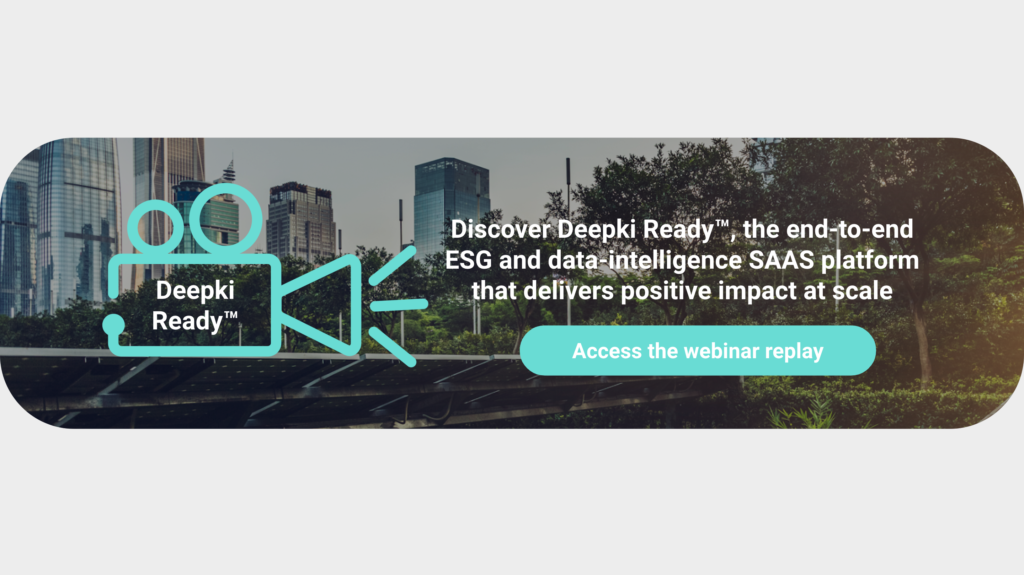As climate change continues to have severe consequences throughout the world, it is imperative for our economy to prioritize sustainable investments in order to address its consequences. There is, therefore, an increasing need for the participation of the private sectors, such as the real estate industry, in the process of finding sustainable alternatives to climate change. One of these solutions is buying an ESG platform that allows investment actors to comply with regulations as well as contribute to monitoring and lowering greenhouse gas and CO2 emissions in line with the goals set out by the Paris Agreement in 2015.
When faced with a decision, some businesses may have the option to develop an internal solution. This approach could appeal to companies that are pioneering in the field of ESG (Environmental, Social, and Governance) and have ample financial resources to experiment and test original solutions. While some firms may prefer to develop the entire software system in-house, purchasing a solution is a favorable and advantageous option for companies with limited capital to allocate toward testing and piloting practical solutions.
When considering the acquisition of an ESG solution, the question arises: what are the advantages of purchasing a solution as opposed to developing one in-house? Clients typically purchase products for two main reasons: necessity and convenience. In this article, we will delve into the motivational principles that drive the purchasing of a SaaS platform aimed at addressing a company’s ESG requirements.
What’s at stake
With the growing awareness and emphasis on ESG-related topics from regulators, investors, and customers, companies face new challenges. One of the most pressing challenges for businesses is determining the most effective way to manage ESG risks and opportunities.
There is a growing expectation from stakeholders that companies take responsibility for their ESG impact on the global crisis the world is currently facing. Failure to address these concerns can result in reputational damage, regulatory penalties, and legal liabilities.
Thus, it’s essential for companies to implement robust ESG management practices, which include establishing clear ESG policies, engaging with suppliers on ESG issues, monitoring compliance, and reporting on ESG performance. By addressing the frameworks correctly and maintaining the required management, companies can create long-term value for stakeholders while contributing to a more sustainable future. It’s thus necessary in today’s business world to consider ESG platforms to facilitate ESG compliance with regulations to ensure the protection of your assets.
Where we stand today
Sustainable investing has become an increasingly popular approach among institutional and individual investors today. One of the reasons behind its growing popularity is its potential to impact investment returns positively. While researchers are still exploring the complex relationship between ESG performance and corporate financial performance, there is evidence to suggest that sustainable investing and superior investment returns are positively correlated. This has provided many investors with a compelling reason to pursue sustainable investment strategies as a means of achieving market-rate returns while making a positive impact on society and the environment.
Sustainable investing is becoming increasingly important globally, with European asset managers holding the highest proportion of sustainable investments, followed by Australia, New Zealand, and Canada. Sustainable investments accounted for 26 percent of assets under professional management in Asia, Australia, New Zealand, Canada, Europe, and the United States, amounting to a total of $22.89 trillion at the start of 2016. According to a study by EY, investments in sustainability typically perform as well as, and often better than, comparable traditional investments across assets and over time.
This investment strategy particularly appeals to millennials, who prioritize ESG impact in their investments. The study by EY reveals that 84% of millennials prioritize investing with a focus on ESG impact. As a result, wealth and asset managers need to recognize the demographic changes happening in the investment industry and adapt to attract the growing number of millennial investors who are interested in sustainable investments. To tap into the over $4 trillion market, wealth and asset managers must consider sustainable investments and adapt quickly to this shift. Some of these investments may include SaaS platforms, such as Deepki Ready™, to help meet the company’s needs, all the while ensuring a positive impact that can have positive financial returns.
Read also: The Evolution of ESG Regulation in Real Estate.
Keep up with compliance
The European Union has been a global leader in sustainable finance regulations, and in 2018, it launched an action plan on financing sustainable growth, such as the Taxonomy Regulation. Article 20 of the Taxonomy Regulation is written by experts from the public and private sectors to advise the Commission on technical screening criteria for the EU Taxonomy and sustainable finance in order to monitor and report on capital flows towards sustainable investments. The Taxonomy Regulation has shown to be particularly important for driving consistent development of future legislation, such as the most recent CSRD regulation update.
Read also: EU Green Deal: CSRD incorporated during COP27.
Companies in the EU as well as foreign companies with EU business interactions are obliged to comply with the current regulations in place. Failure to comply has multiple negative effects, such as “negative screenings.” Negative screening involves the exclusion of companies, sectors, or regions from investment consideration based on their ESG performance. This enables investors to filter out companies that do not meet their standards or are performing below industry averages for specific ESG factors. For instance, carbon emissions data is now widely accessible and has allowed investors to screen companies based on their environmental impact.
Despite the growing interest in sustainable investing, there are still challenges that need to be addressed. There is still a perception that sustainable investing means sacrificing financial returns. While this may have been true in the past, as the EY study mentioned earlier shows, sustainable investing can deliver competitive returns. In fact, some argue that considering ESG factors can help identify companies with better management and risk mitigation practices, which can lead to long-term financial outperformance.
A SaaS platform dedicated to ESG reporting can help address the challenges of standardization and transparency in sustainable investing while also providing valuable insights and tools to investors and asset managers. ESG platforms, such as Deepki Ready™, provide economic and macroeconomic variables to keep in mind for risk management and proper compliance with the complex demands of these budding regulations. As sustainable investing continues to gain momentum, these platforms will likely become an increasingly important tool for both companies and investors.
Read also: How do I comply with the EU Taxonomy?
Optimize your strategy
Manual collection of ESG data within a company can be a time-consuming and resource-intensive process, often involving the consolidation of data from multiple sources and the manual entry of data into spreadsheets or other systems. This process can be prone to errors, including data entry errors and inconsistencies in data definitions and formats, which can undermine the accuracy and reliability of the data.
Having to collect data manually is not scalable, particularly as the volume and complexity of ESG data increases, making it difficult to efficiently manage and track data across multiple business units or locations. Additionally, the lack of real-time data makes it difficult for decision-makers to respond quickly to ESG risks and opportunities. It can be costly in terms of time, resources, and lost opportunity, as companies may miss out on potential efficiencies and cost savings that could be gained from more automated and integrated approaches.
“We collected more data in 5 months than we did over the past five years. Our data collection process is now faster, clearer, and more transparent. Pretty soon, we won’t need tenants’ invoices anymore for private energy data – and we’re offering them an additional service.”
Henri Chapouthier, CSR manager at ICADE
ESG SaaS platforms offer a comprehensive solution to monitor and manage market and credit risk from an integrated perspective. With the growing importance of ESG factors in investment decision-making, these platforms provide a centralized system for collecting, analyzing, and reporting ESG data in a structured and standardized way. By automating the process of data collection, companies can reduce the time and resources required for manual data collection and analysis, which can sometimes be prone to errors.
By providing real-time alerts and monitoring tools, these platforms enable companies to track ESG-related subjects and take necessary actions to mitigate their potential negative impacts. This can include monitoring everything from primary to final energy consumption and CO2 emissions. By using an ESG SaaS platform, companies can demonstrate their commitment to sustainability and transparency while also improving their ability to manage risk and maximize returns.
Read also: Behind the scenes of the ESG index.
Building your own platform may not cut it
Whether the firm chooses to outsource or develop the software system in-house, the result must be a robust, auditable technology that meets both the firm’s needs, as well as the constantly evolving regulatory standards.
Building an in-house ESG program requires a significant investment of time, resources, and expertise. The company must create the program from scratch, which includes identifying relevant ESG factors, designing data collection methods, analyzing the data, and reporting the findings. The company is also responsible for ensuring that the program remains up-to-date with changing regulations, evolving ESG standards, and emerging risks. While building an in-house program provides companies with greater control over their ESG reporting, it can be a resource-intensive process that takes time away from other important business activities.
Moreover, building and maintaining such models is technically complex and expensive, requiring significant resources. Even if firms outsource some of the tasks, managing the entire process can be difficult. In the current environment, the complexity of market risks and the demands of management means that companies are likely to face a sustained period of development and refinement of models, software, assumptions, and related practices.
On the other hand, buying an ESG platform can provide companies with a ready-made, comprehensive solution for their ESG reporting needs. An established ESG platform comes equipped with the necessary expertise, experience, and technology to collect, analyze, and report ESG data effectively. This means that companies can have access to ESG performance metrics quickly and easily without having to invest in their own ESG program. ESG platforms also offer the benefits of data centralization, which can be valuable for companies looking to manage and report on their ESG performance. With a centralized data repository, companies can have a holistic view of their ESG performance, allowing them to identify areas for improvement and make data-driven decisions.
Read also: Data collection: going for a pragmatic approach.
Conclusion
As companies adapt their ESG programs to meet expanding reporting obligations, an external solution is specifically designed to translate insights and actions into disclosures that align with ESG reporting frameworks. Although buying an external SaaS platform such as Deepki Ready™ does require additional financial resources, it is helpful to consider the increased ROI that could be attained with a tool whose function is to optimize the ESG management of your assets.
“In 7 months, we were able to reduce energy consumption by 14% across our customer portfolio. For Klépierre, this translates to €6 million in savings for our tenants.”
Franck Tharreau, Group Head Of Engineering & Sustainability at Kelpierre
Many of Deepki’s clients experienced the same pain points as most major actors in the real estate industry; difficulty collecting data, managing energy consumption as a result of missing or inaccurate data, and collecting and following up with invoices or payments. Our SaaS platform has helped some of the major real estate players save time as well as money, making any investment an absolute necessity for the ESG strategy in place for the long-term protection of their portfolio. If you have any questions about how Deepki could be the right solution for you, don’t hesitate to contact one of our solutions specialists.



